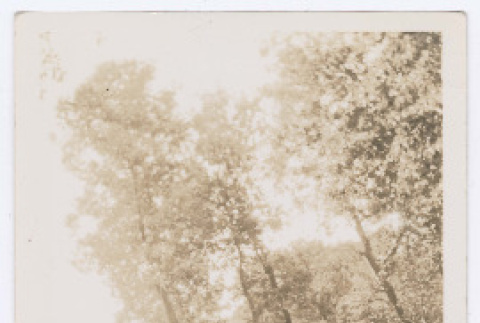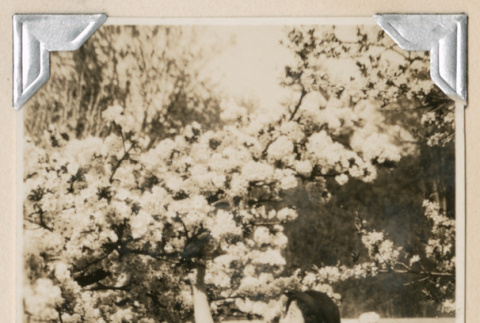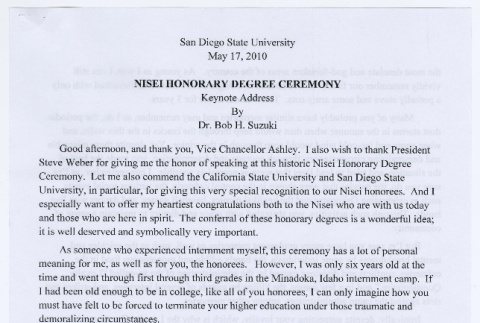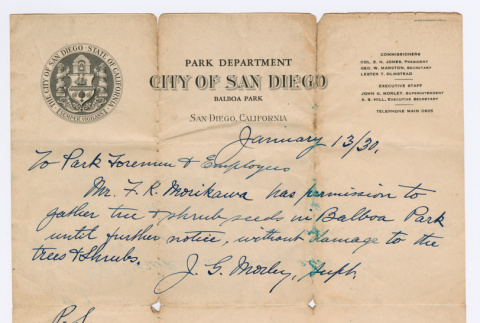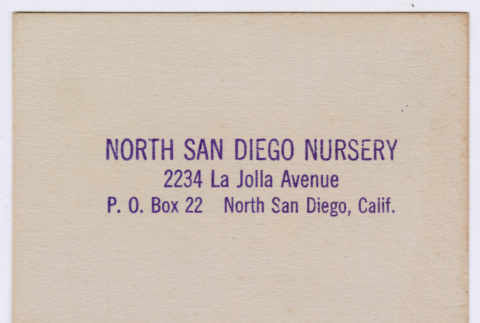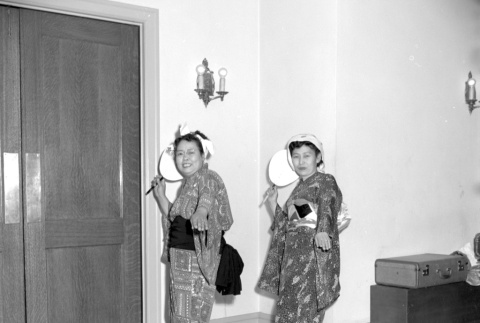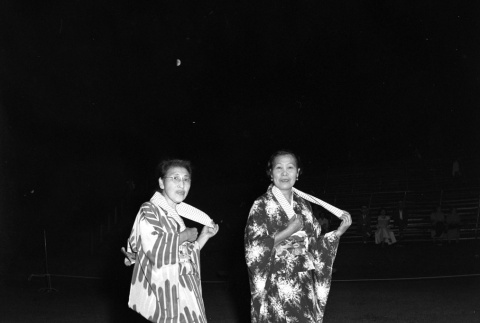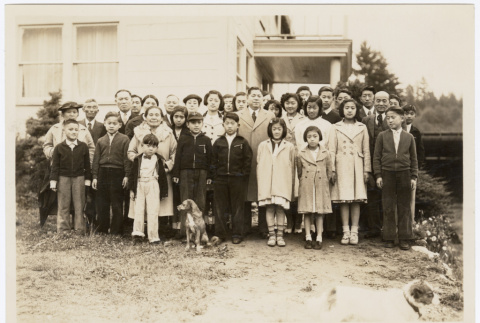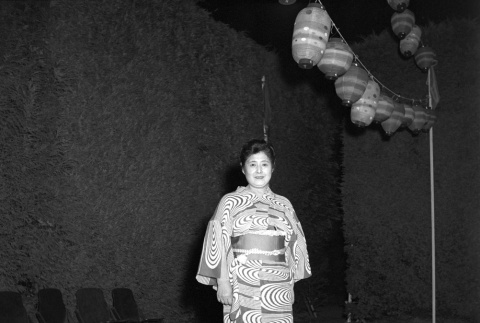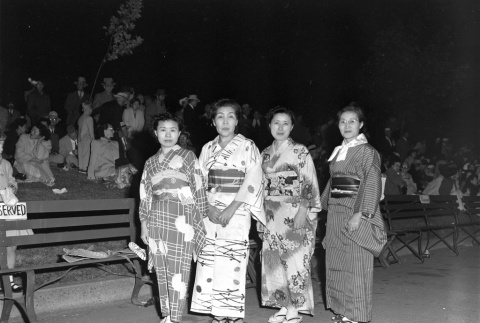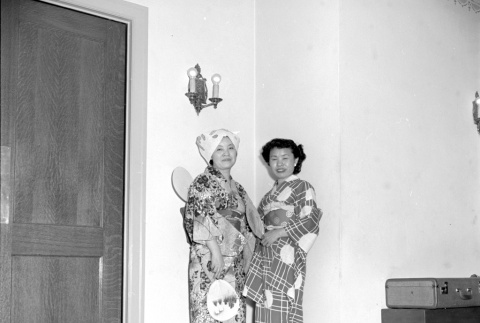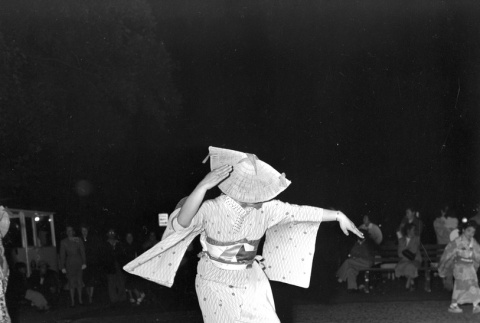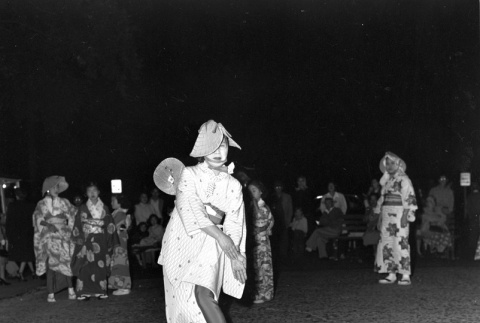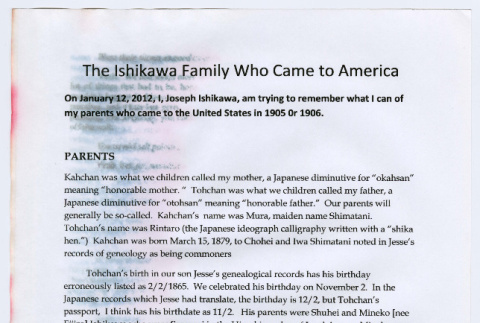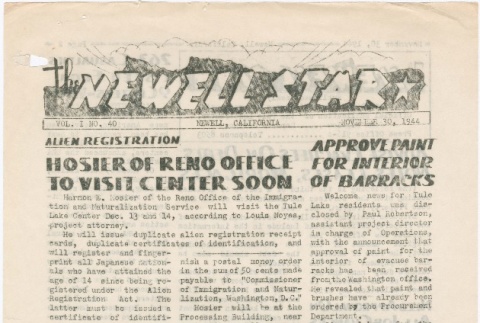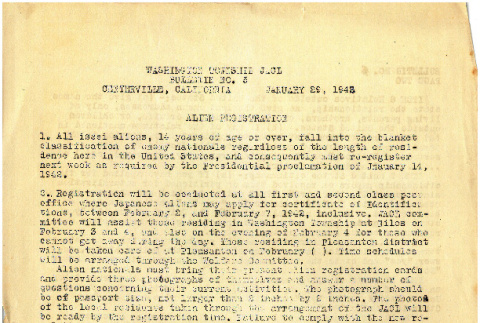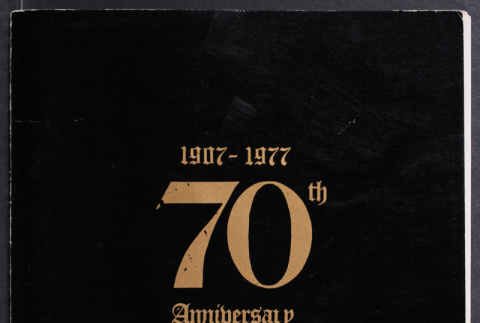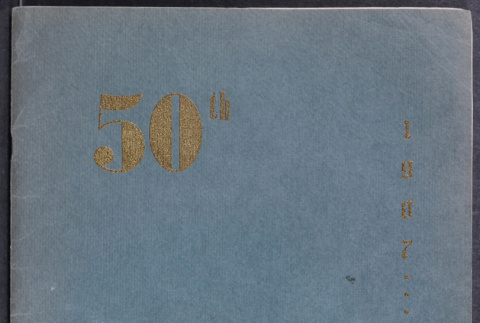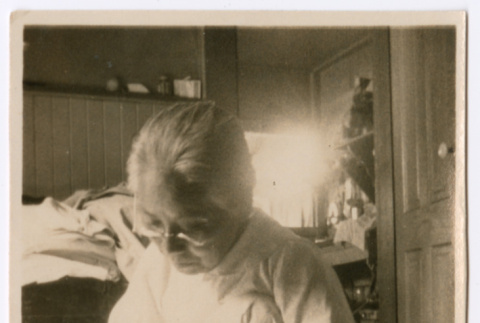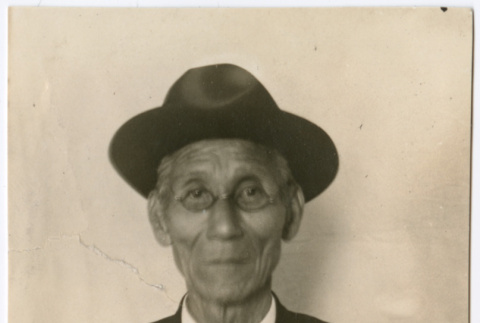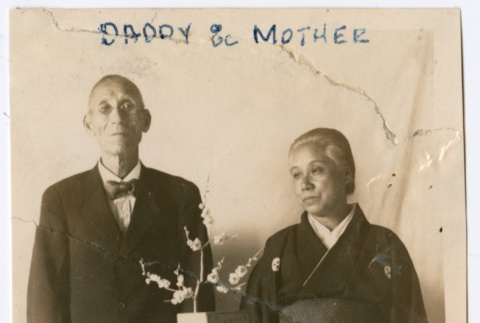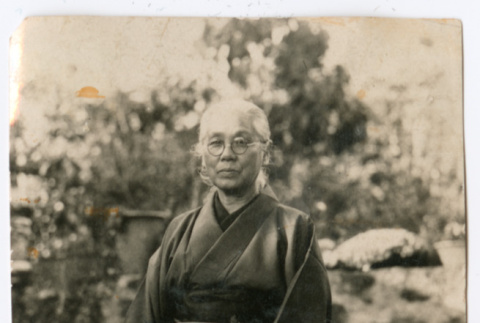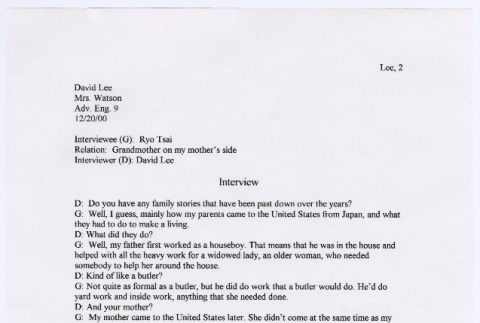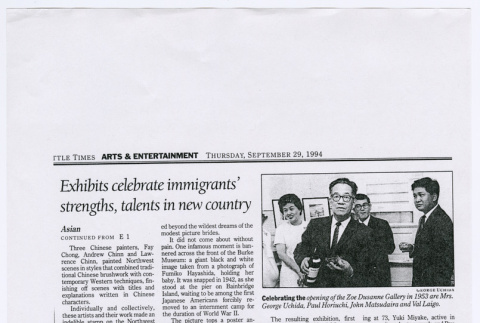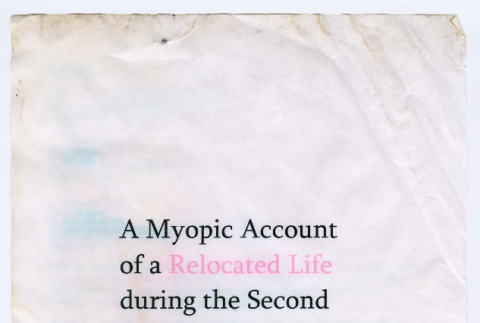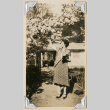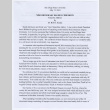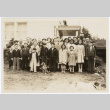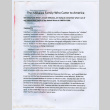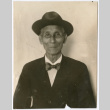Issei
The earliest wave of Japanese immigrants, the Issei (first generation), had a strong sense of their ethnic identity and retained the values and traditions of their country of birth. Most came to the United States as sojourners and planned to return to Japan after earning their fortunes. In addition, discriminatory laws forbade them from becoming American citizens and from exercising other basic rights, such as owning or leasing land. Since they were thus prevented from fully taking part in American life, it is not surprising that many still identified strongly with the culture of their homeland.
Identity and values
(200)
Issei
(1023)
Related articles from the
Densho Encyclopedia :
Issei
1023 items
1023 items
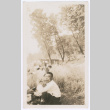
img
Kameki Inouye smoking in park (ddr-densho-383-376)
Written on back of photograph: "Papa at a picnic (heavy smoker)".
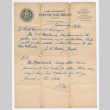
doc
Letter from City of San Diego to Park Foreman and Employees (ddr-densho-446-420)
J. Morley, Superintendent of the San Diego Park Dept., gave permission to F.K. Morikawa to gather seeds and prunings in Balboa Park. This was written during the Great Depression.
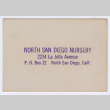
doc
North San Diego Nursery business card (ddr-densho-446-422)
North San Diego Nursery owned by the Morikawas
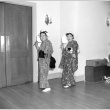
img
Obon Festival- Dancers (ddr-one-1-315)
Black and white photographic negative of two Obon dancers posing with "uchiwa" (fan). From left to right: Tomi Tsujimura and Yachiyo Morita. Obon is an annual event hosted by the Oregon Buddhist Church (now known as Oregon Buddhist Temple) and attended by the wider Nikkei community.
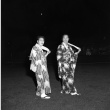
img
Obon Festival- Dancers (ddr-one-1-274)
Black and white photographic negative of two Obon dancers with tenugui (light cotton towels) around their necks posing for the camera. On left is Yukiye Itoyama. Obon is an annual event hosted by the Oregon Buddhist Church (now known as Oregon Buddhist Temple) and attended by the wider Nikkei community.
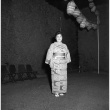
img
Obon Festival- Dancer (ddr-one-1-280)
Black and white photographic negative of Fukiyo Masuda smiling for the camera at Obon. Obon is an annual event hosted by the Oregon Buddhist Church (now known as Oregon Buddhist Temple) and attended by the wider Nikkei community.
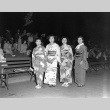
img
Obon Festival- Obon dancers (ddr-one-1-212)
Black and white photographic negative of four Obon dancers posed for the camera in front of a crowd. From left to right: Chieko Yoshihara, Hisano Sakamoto, Sakae Kobayashi, and Kaoru Funatake. Obon is an annual event hosted by the Oregon Buddhist Church (now known as Oregon Buddhist Temple) and attended by the wider Nikkei community. This …
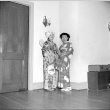
img
Obon Festival- Dancers (ddr-one-1-293)
Black and white photographic negative of two Obon dancers holding "uchiwa" (fan) and smiling for the camera indoors. From left to right: Kuni Kitayama and Chiyoko Yoshihara. Obon is an annual event hosted by the Oregon Buddhist Church (now known as Oregon Buddhist Temple) and attended by the wider Nikkei community.
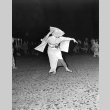
img
Obon Festival- Dancer (ddr-one-1-234)
Black and white photographic negative of Harue Akiyama, the Obon dance instructor, posing for camera wearing straw hat. Obon is an annual event hosted by the Oregon Buddhist Church (now known as Oregon Buddhist Temple) and attended by the wider Nikkei community. This image was taken at Holladay Park in Portland, Oregon.
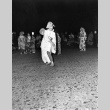
img
Obon Festival- Dancer (ddr-one-1-232)
Black and white photographic negative of Harue Akiyama, the Obon dance instructor, posing for camera wearing straw hat. Obon is an annual event hosted by the Oregon Buddhist Church (now known as Oregon Buddhist Temple) and attended by the wider Nikkei community. This image was taken at Holladay Park in Portland, Oregon.
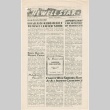
doc
The Newell Star, Vol. I, No. 40 (November 30, 1944) (ddr-densho-284-42)
Selected article titles: "Comply with Smoking Ban at All Indoor Gatherings" (p. 1), "263 Casualties Listed from 9 Centers-WRA" (p. 2), and "Issei Volunteers to Be Accepted by U.S. Army" (p. 2).
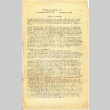
doc
Bulletin No. 8 published by the Washington Township JACL (ddr-ajah-7-4)
Instructions to Issei requiring them to re-register
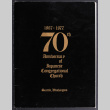
doc
70th Anniversary of the Japanese Congregational Church (ddr-densho-474-53)
The Japanese Congregational Church's 70th Anniversary book traces the history of JCC within the context of national and local events.
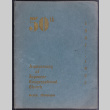
doc
50th Anniversary of the Japanese Congregational Church (ddr-densho-474-52)
This book traces the first fifty years of the history of the JCC in Seattle. The first four pages covering the introduction from Rev. Archie H. Hook and the brief overview of the church's history are in English, as are the photo captions throughout the book.The bulk of the text is in Japanese. The JCC members' …
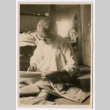
img
Hide (Ninomiya) Yamamoto (ddr-densho-492-40)
Photograph of Hide (Ninomiya) Yamamoto working on a textile
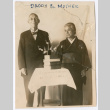
img
Kurakichi Yamamoto and Hide (Ninomiya) Yamamoto (ddr-densho-492-45)
Portrait of Kurakichi Yamamoto (left) and his wife Hide (Ninomiya) Yamamoto (right). Written along the top is "Daddy bc Mother" in blue ink. Written on the back is "Kurakichi Hawaii / 1856-1923 / Hide / Ninomiya / 1863 /1945 Hawaii" in pencil.
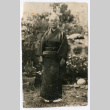
img
Hide (Ninomiya) Yamamoto (ddr-densho-492-52)
Photograph of Hide (Ninomiya) Yamamoto dressed in kimono. Written on the back is "Soichi's Mother" in blue ink. Caption on back in Japanese
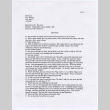
doc
Interview with Ryo Tsai (ddr-densho-446-415)
Written by Ryo Tsai's grandson David Lee for his high school heritage project
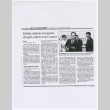
doc
Seattle Times: Exhibits celebrate immigrants' strengths, talents in new country (ddr-densho-446-452)
Article titled "Japanese-American women" noted that the 11 NW women added to the exhibit at the Burke were chosen by a committee of their peers.
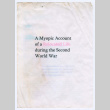
doc
A Myopic Account of a Relocated Life during the Second World War (ddr-densho-468-97)
Personal recollections of life in an assembly center and relocation camp for Japanese descendants and various digressions
